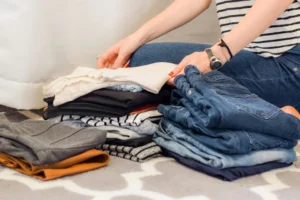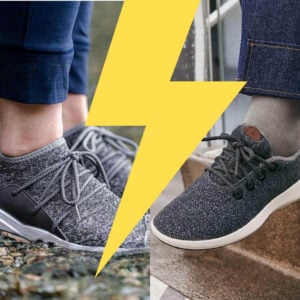So you’re looking for a new pair of shoes? You might want to think twice about that impulse buy in buying a new pair of shoes, especially if it’s from a brand that isn’t using sustainable materials or ethical production.
We’ve rounded up some footwear industry facts which might make you think twice about supporting the mass footwear industry.
Footwear Industry Facts
1.In 2020, the global footwear market was valued at $365.5 billion and is estimated to reach $530.3 billion by 2027. [alliedmarketresearch]
2. The worldwide consumption of footwear is estimated to be more than 20 billion pairs of shoes per year, with less than 5% of shoes being recycled, with most being disposed of in landfills. [Lee and Rahimifard 2012]
3. The leather uppers and outsole used in many popular footwear brands are Chrome-Tanned Leather. Leather is tanned with Chromium, a toxic chemical used for tanning leather’s cheap, fast method. Chromium poses a severe health risk for workers in tanneries, as Chromium is a carcinogen known to cause damage to gastrointestinal, respiratory, and reproductive systems. [bettershoes.org]
The United States has the highest per capita shoe consumption, with each inhabitant purchasing an average of 6.9 pairs of shoes every year.
Staikos
4. The United States has the highest per capita shoe consumption, with each inhabitant purchasing an average of 6.9 pairs of shoes every year. [T. STAIKOS* and S. RAHIMIFARD]
5. The footwear industry is classified as the fifth-worst industry to impact the environment negatively [Spahio 2020].
6. Around 9 out of every 10 pairs of shoes are manufactured in Asia. [Zavodna, 2020] Where, unfortunately, poverty wages are a huge problem, with approximately only 2% of the price of a pair of shoes paid to the workers who made them. [Labour behind the label]
7. China is the largest producer of footwear globally. [Statistica]

8. Footwear brands can use over 40 different materials to manufacture one single shoe. [Zavodna, 2020]
9. EVA foam soles are a common material used in the production of athletic shoes worldwide. However, EVA is produced from petroleum, and therefore the EVA used to manufacture shoe soles results in severe environmental pollution of groundwater and rivers when disposed into landfills. [Wiki]
When disposed of in landfills, athletic footwear can take up to thousands of years to naturally degrade.
Wiki
10. When disposed of in landfills, athletic footwear can take up to thousands of years to naturally degrade. [Wiki]
11. Nike’s “Reuse-A-Shoe” program is one of the only product take-back and recycling schemes established by a large-scale shoe manufacturer. So far, the scheme has recycled 16 million pairs since 1993. [Staikos]
12. Since 2013, there have been 131 worker deaths caused by fires in footwear manufacturing factories worldwide. [bettershoes] This is unfortunately due to a lack of heath and safety in the workplace, and poor working conditions.
Conclusion
Think twice about throwing away your old shoes, look for a recycling scheme instead, think about the impact every pair you buy has on people and the planet.
When choosing footwear, look for brands using sustainable materials and ethical production to create sustainable footwear.
The market is growing in the use of sustainable products including natural biodegradable fibers, and EVA soles from natural materials. Check out our guides on sustainable sneakers, running shoes, and sandals to discover brands changing the footwear industry.
Looking to repair your old shoes? Check out our guide on repairable shoes here!



